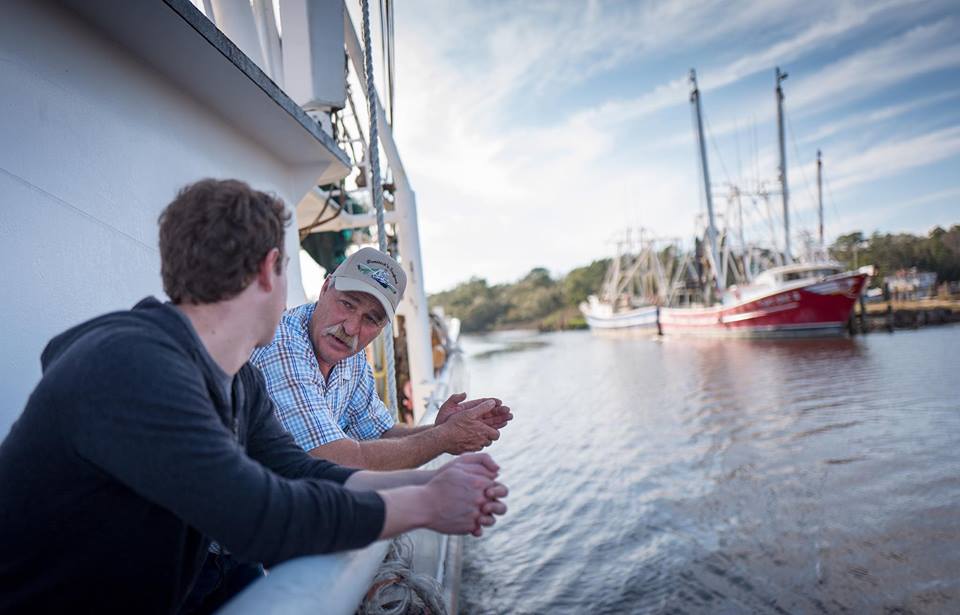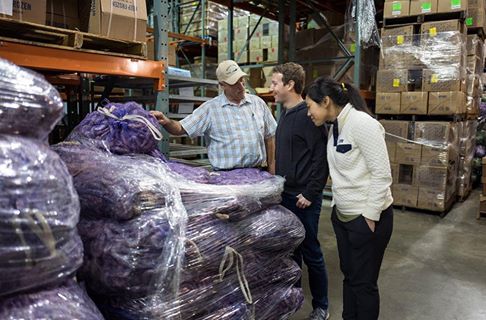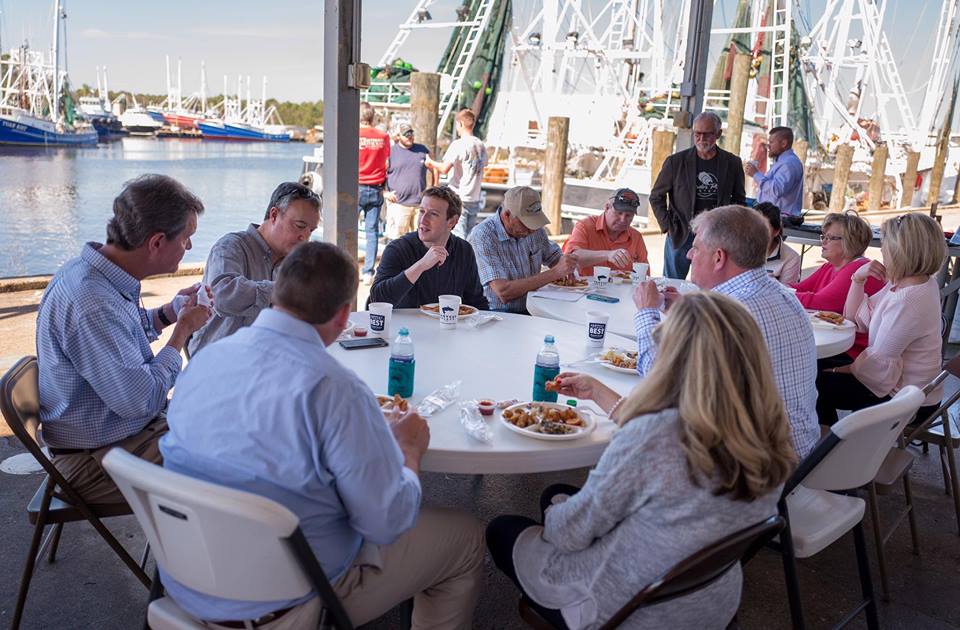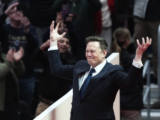By Glynn Wilson –
MOBILE, Ala. — Facebook’s Mark Zuckerberg showed up on the Gulf Coast Sunday just in time for Mardi Gras and had people speculating that he may have a political future in mind.
Dutifully, all three local television news stations covered the visit like any other celebrity sighting. But due to a recent manifesto published by Zuckerberg on his own Facebook page, some observers were led to speculate about the political intrigue.
At WKRG News 5, they “confirmed” that Zuckerberg was “spotted” in Mobile.
“News 5’s own producer Audrey Michael spotted Zuckerberg and his wife earlier at Serda’s Cafe Company on Royal Street this afternoon but got too star struck to snap a photo of him before he left the Cafe,” they reported. “Many people are wondering what one of the richest men in America is doing in Mobile. His visit may have something to do with a 50 state tour he and his wife had planned on doing back in 2016.”
Something to do with it? Zuckerberg reported just that on his Facebook page, which anyone can view, and that’s where all the photos came from. He refused to grant interviews or answer questions and simply reported on his visit on his own Facebook page.
“Every year, I take on a personal challenge to learn new things and grow outside of my work. My personal challenge for 2017 is to have visited and met people in every state in the US by the end of the year. I’ve spent significant time in many states already, so I’ll need to travel to about 30 states this year to complete this challenge,” Zuckerberg says. “My hope for this challenge is to get out and talk to more people about how they’re living, working and thinking about the future. Priscilla and I have enjoyed taking road trips together since we started dating. Recently, I’ve traveled around the world and visited many cities, and now I’m excited to explore more of our country and meet more people here.”
Then, WPMI Channel 15 News reported that “one of the richest men in the world” Mark Zuckerberg and his wife Priscilla Chan were spotted at the Aimwell Baptist Church and that they chose to visit Mardi Gras in Mobile rather than New Orleans for a more “family friendly” and “less intense” experience.
The Zuckerbergs also visited The Haberdasher Saturday night as well as the Pizzeria Delphina.
Also, WALA Fox 10 News reported that the Zuckerberg’s “made a stop in Mobile Sunday. It was all apart of his challenge to visit every state in the U.S.”
“The multi-billionaire posted about his experience visiting the Port City on Facebook saying, ‘We spent the day in Mobile and Bayou La Batre — the seafood capital of the state,”’ they reported.
“We had lunch with Dominick Ficarino, a fourth generation shrimper, and workers from the local fishing business right on the dock,” Zuckerberg said in his Facebook post. “They shared stories of their community’s perseverance through Hurricane Katrina and the Gulf oil spill five years later. They shared the challenges of low-priced foreign imports and not having enough workers to meet their labor needs. One of the families we met were the Zirlotts — they run an oyster farm and are succeeding by using Facebook and Instagram to show their product directly to chefs. The fishing industry is more than a job to these folks — it’s their community and a way of life.”
But some of Zuckerberg’s innocent sounding comments led critics to speculate that there may be more to the trip than meets the eye. Donald Trump effectively launched his presidential bid in Mobile, a fact that cannot be lost on Zuckerberg. Trump ran a nationalistic, populist campaign about “putting America first,” while Zuckerberg talked about “the strength of local communities” making up “our social fabric,” which “enables us to come together as a global community…”
In Zuckerber’s so-called manifesto, Building Global Community, here is what he said.
On our journey to connect the world, we often discuss products we’re building and updates on our business. Today I want to focus on the most important question of all: are we building the world we all want?
History is the story of how we’ve learned to come together in ever greater numbers — from tribes to cities to nations. At each step, we built social infrastructure like communities, media and governments to empower us to achieve things we couldn’t on our own.
Today we are close to taking our next step. Our greatest opportunities are now global — like spreading prosperity and freedom, promoting peace and understanding, lifting people out of poverty, and accelerating science. Our greatest challenges also need global responses — like ending terrorism, fighting climate change, and preventing pandemics. Progress now requires humanity coming together not just as cities or nations, but also as a global community.
This is especially important right now. Facebook stands for bringing us closer together and building a global community. When we began, this idea was not controversial. Every year, the world got more connected and this was seen as a positive trend. Yet now, across the world there are people left behind by globalization, and movements for withdrawing from global connection. There are questions about whether we can make a global community that works for everyone, and whether the path ahead is to connect more or reverse course.
This is a time when many of us around the world are reflecting on how we can have the most positive impact. I am reminded of my favorite saying about technology: “We always overestimate what we can do in two years, and we underestimate what we can do in ten years.” We may not have the power to create the world we want immediately, but we can all start working on the long term today. In times like these, the most important thing we at Facebook can do is develop the social infrastructure to give people the power to build a global community that works for all of us.
For the past decade, Facebook has focused on connecting friends and families. With that foundation, our next focus will be developing the social infrastructure for community — for supporting us, for keeping us safe, for informing us, for civic engagement, and for inclusion of all.
Bringing us all together as a global community is a project bigger than any one organization or company, but Facebook can help contribute to answering these five important questions:
How do we help people build supportive communities that strengthen traditional institutions in a world where membership in these institutions is declining?
How do we help people build a safe community that prevents harm, helps during crises and rebuilds afterwards in a world where anyone across the world can affect us?
How do we help people build an informed community that exposes us to new ideas and builds common understanding in a world where every person has a voice?
How do we help people build a civically-engaged community in a world where participation in voting sometimes includes less than half our population?
How do we help people build an inclusive community that reflects our collective values and common humanity from local to global levels, spanning cultures, nations and regions in a world with few examples of global communities?
My hope is that more of us will commit our energy to building the long term social infrastructure to bring humanity together. The answers to these questions won’t all come from Facebook, but I believe we can play a role.
Our job at Facebook is to help people make the greatest positive impact while mitigating areas where technology and social media can contribute to divisiveness and isolation. Facebook is a work in progress, and we are dedicated to learning and improving. We take our responsibility seriously, and today I want to talk about how we plan to do our part to build this global community.
But his comments led the UK Observer to question his motives in an editorial saying “his Facebook vision is anything but benign.”
‘Are we building the world we want?” Mark Zuckerberg, the billionaire CEO of Facebook, asked last week in a 5,700-word post that was quickly dubbed a “manifesto”. He used it to launch a strident defence of globalisation, striking a discordant note with the populism of contemporary political debate, and to set out his vision for the role he believes Facebook should play in creating a better world.
While Zuckerberg appears to acknowledge some of the criticism that has been levelled at an increasingly powerful Facebook in recent years, it would be wrong to be lulled into a false sense of security by his reassuringly benign tones. In his post, he signals a shift in Facebook’s mission, historically focused on giving people the power to share and connect. On Friday, Zuckerberg wrote “the most important thing we at Facebook can do is develop the social infrastructure to give people the power to build a global community that works for all of us”.
But there is something chilling in Zuckerberg’s failure to recognise that Facebook is already a for-profit form of social infrastructure, with immense and unprecedented power over our lives. And in making its profit, Facebook creates social value, yes, but also social harm.
Facebook’s stunning reach extends beyond that which any other company has ever had. A quarter of the world’s population – 1.86 billion people – have Facebook accounts. Facebook shapes the way they consume, process and interact with information, and with each other. It got there by pursuing aggressive growth strategies. For areas of the world where consumers cannot readily afford the internet access required to consume Facebook, it has developed a superficially philanthropic initiative, internet.org, to give consumers in the global south free internet access. But look deeper, and it is clearly about building Facebook’s user base and profits, offering strictly limited access: just to Facebook and a few of its partner sites. Banned by Indian regulators after a public outcry mobilised by local internet entrepreneurs, in several other countries, it has faced little pushback.
Facebook’s monopoly-style power extends far beyond people’s internet access. Together with Google, it has cannibalised the online advertising revenue so vital to enabling the investigative journalism that has never been more important in today’s world. Zuckerberg barely acknowledges Facebook’s role in the accelerating demise of the traditional media, and offers nothing beyond inane platitudes.
By filtering the information we see, Facebook also changes the way we think. Its algorithms – whose design, of course, is motivated by profit – function as editors, pushing us to content that we are most likely to find engaging, from people we are naturally drawn to.
In doing so, Facebook facilitates the filter bubbles that mean we are increasingly consuming content created by people who think and act exactly like us, and has done little to combat the spread of fake news. Zuckerberg writes “our community will identify which sources provide a complete range of perspectives so that content will naturally surface more”.
But there is nothing “natural” or organic about an editorial process. Facebook has a duty to make its editorial algorithms transparent so its users know what they are consuming.
Like other corporate giants, Facebook has done all in its power to minimise its tax bill, paying a fraction of what it owes the societies from which it draws its profits, undermining the very social infrastructure Zuckerberg claims to want to build. Yet Silicon Valley entrepreneurs have the gall to argue that government should pay everyone an unconditional basic income while one of its biggest darlings pays hardly any tax. It forewarns of a feudal-type world where a select few own all the technological wealth and pay the rest of us just enough to eke out a basic subsistence.
Save perhaps Google, no other company matches Facebook’s influence. But it signals a bigger shift in economic power, enabled by technology, away from consumers, producers and employees, to platforms such as Uber and Airbnb that add infrastructure rather than productive capacity to the economy.
Our outdated systems of national and international regulation lag far behind the way they operate. While there are no laws to stop apps such as Deliveroo slashing by half tomorrow the prices it pays the couriers it claims are self-employed, there are laws to stop companies doing that to their employees. Treating people well shouldn’t be in companies’ gift: it should be the law.
All this is happening at a time when the boundaries between politics and business are blurring, with a billionaire president who has brought corruptive conflicts of interest into the White House. By Zuckerberg’s own admission “in recent campaigns around the world… we’ve seen the candidate with the largest and most engaged following on Facebook usually wins”. If Zuckerberg were to run for president in the future, as some have speculated, would he be all but unbeatable?
This is not an argument about corrupt, all-powerful individuals. Zuckerberg’s philanthropy suggests his self-professed desire to create social value is genuine. Rather, Facebook is the grim sign of something going seriously wrong in our economic model. The balance of economic power – so critical in holding companies accountable – is tipping in favour of a small group of companies in a corner of California that governments are proving unwilling or unable to properly regulate.
Zuckerberg’s pitch is a warning to us all. If he really wanted to do good, he would be launching a debate on how governments can regulate new-age natural monopolies such as Facebook, and publishing Facebook’s algorithms to make them as transparent as newspaper editorial policies. But Zuckerberg is a businessman, not a political leader: why should he do this when it risks profits?
Facebook’s success is prophetic of a future in which we may all have to rely on a few all-powerful companies benevolently gifting us scraps like grants for struggling media organisations, or a meagre basic income to supplement poverty wages. But today, consumers and citizens still have the power to demand something different, and the laws of our lands still have the power to enforce it. We should act while we can.
In addition to being the town that launched Trump’s ultimately successful presidential campaign, Mobile is also the home town of Trump’s Attorney General Jeff Sessions, who was one of Zuckerberg’s biggest critics in the U.S. Senate.
The Republican Senator targeted Zuckerberg because he is the founder of a Silicon Valley based company that lobbies the government to make reforms to the immigration system. Sessions singled out Zuckerberg for taking jobs away from American workers and giving them to immigrants to drive down his company’s costs.
Sessions, a Republican who is known for his fierce opposition to amnesty for illegal immigrants, railed on the Senate floor against Zuckerberg and other Democrats backing executive action by president Obama and legislation authored by the Gang of Eight that would increase the number of guest worker permits.
“The ‘masters of the universe’ are very fond of open borders as long as these open borders don’t extend to their gated compounds and fenced-off estates,” Sessions claimed in his incoherent rant. “The (Obama) administration is meeting with the elite, the cosmopolitan set, who scorn and mock the concerns of everyday Americans who are concerned about their schools, jobs, wages, communities, and hospitals.”
What?
Do you find that it is harder and harder to figure out these days what’s really going on in a world full of political innuendo and “alt-facts?”
It might be best not to trust Trump, Sessions — or Zuckerberg.
More Photos
















